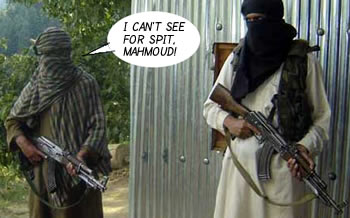"Iran
 ...Formerly a fairly civilized nation ruled by a Shah, it became a victim of Islamic revolution in 1979...
...Formerly a fairly civilized nation ruled by a Shah, it became a victim of Islamic revolution in 1979...and Iran-aligned militias continue to have strong ties to some elements of Iraq’s traditional security forces," the Pentagon’s inspector general informed Congress in a new report on U.S. military operations in the region. Iraq’s federal police and emergency response division, both overseen by Iraq’s Interior Ministry (MOI), as well as the Iraqi Army’s fifth and eighth divisions "are the units thought to have the greatest Iranian influence." However,
some people cause happiness wherever they go; others whenever they go...
"officers sympathetic to Iranian or militia interests are scattered throughout the security services."
The report marks the first unclassified admission that Iran controls and directs large swaths of Iraq’s security infrastructure, according to current and former U.S. officials who spoke to the Washington Free Beacon. Though Iran’s influence has been an open secret for decades, the Pentagon continued to provide funding to Iraq’s MOI, which is siphoned to the country’s Badr Corps, an Iran-created fighting force that was absorbed into Iraq’s security infrastructure after the U.S. invasion of the country in 2003.
The high-ranking presence of the Badr Corps in Iraq’s security forces has long been a source of concern for Iran hawks in Congress. But the Pentagon’s first public acknowledgment of their power is renewing calls for the Biden administration, the same old faces in slightly different places, the same old ideas, the same old graft
...the collection of boodlers, grifters, hangers-on, and self-proclaimed
expertsaffiliated with the Biden Crime Family. Entrusted with an entire nation as the result of a suspicious election, they set about happily implementing stuff they absorbed in college, all of which blew up and splattered the rest of us...
to cut off funds to Iraq’s MOI and designate the Badr Corps as a terrorist group due to its ties to Iran’s Islamic Revolutionary Guards Corps (IRGC).
"The DoD’s Inspector General report proves what we’ve known for too long—Iraq’s federal police and MOI have been infiltrated by Iranian-backed militias," Rep. Greg Steube (R., Fla.), a member of the House Foreign Affairs Committee, told the Free Beacon. "President Trump’s [National Security Council] warned of this exact scenario and made efforts to cut off funding. With this report in hand, it’s time Congress finally take action to defund any U.S. support going to Iraq’s MOI and federal police forces. Our U.S. taxpayer dollars have no place in the hands of the Iranian regime."
While the Trump administration privately raised concerns about the Badr Corps and Iran’s growing presence in Iraq’s security forces, it was not able to cut funding due to objections from the Pentagon, according to sources familiar with the matter. Despite their ties to Iran, the Badr Corps and other Iranian militia groups in Iraq are seen as central to the battle against ISIS, a rival terrorist faction.
"It was always surprising that DOD justified paying the MOI given their control by Badr Corps and the IRGC," one former Trump administration official who handled Iran and Iraq policy told the Free Beacon. The official requested anonymity in order to openly discuss the sensitive topic.
With the Biden administration in the final stages of inking a new nuclear accord with Iran, it is unlikely the United States will cut funding to the MOI and Badr Corps.
Matthew Zais, a former senior Trump administration official, acknowledged on Twitter last week that the Trump administration "tried to stop" the Defense Department from giving cash to Iraq’s MOI. These efforts were followed with a bid by the Republican Study Committee (RSC), the largest GOP caucus in Congress, to stop American funds from reaching Iranian-backed bully boyz in Iraq. In its 2021 budget proposal, the RSC called for defunding Iraq’s MOI due to Iranian infiltration of its ranks.

 ...Arabic for
...Arabic for  ...an adherent of takfir wal hijra, an offshoot of Salafism that regards everybody who doesn't agree with them as apostates who must be killed...
...an adherent of takfir wal hijra, an offshoot of Salafism that regards everybody who doesn't agree with them as apostates who must be killed... A July 31 deadline has been set for all Popular Mobilization Forces (PMF, known as Hashd al-Shaabi in Arabic) paramilitaries to integrate into the Iraqi army, said the Iraqi Prime Minister in a statement on Monday, reining them in to centralized control.
A July 31 deadline has been set for all Popular Mobilization Forces (PMF, known as Hashd al-Shaabi in Arabic) paramilitaries to integrate into the Iraqi army, said the Iraqi Prime Minister in a statement on Monday, reining them in to centralized control. U.S. forces in armored vehicles battled Mahdi Army fighters Thursday in Sadr City, the vast Shiite stronghold in eastern Baghdad, as an offensive to quell party-backed militias entered its third day. Iraqi army and police units appeared to be largely holding to the outskirts of the area as American troops took the lead in the fighting.
U.S. forces in armored vehicles battled Mahdi Army fighters Thursday in Sadr City, the vast Shiite stronghold in eastern Baghdad, as an offensive to quell party-backed militias entered its third day. Iraqi army and police units appeared to be largely holding to the outskirts of the area as American troops took the lead in the fighting.